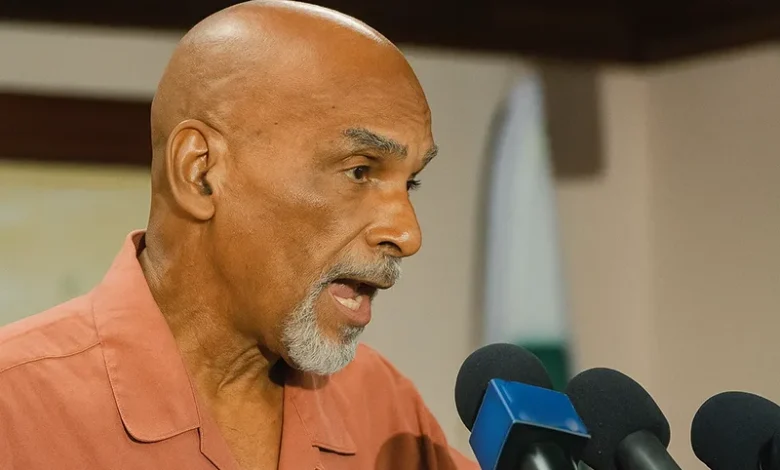Atherton “Athie” Martin

Atherton “Athie” Martin was born in the 1960s in Dominica, raised in a devout Roman Catholic family and educated at Saint Mary’s Academy (SMA) in Roseau. As a youth, he served as an acolyte in the Catholic Church, reflecting early religious commitment.
Athie’s formative years coincided with the Civil Rights and Black Power eras in the United States. He pursued higher education at Cornell University, earning a degree in agricultural science, also known as agronomy. Immersed in the activism of that period, he became deeply influenced by ideas of social justice, equality, and agrarian reform among marginalised communities.
Upon returning to Dominica, Athie worked as the manager of the Castle Bruce Estate, which was owned by the Commonwealth Development Corporation (CDC). It was in the early 1970s that he led a worker strike after refusing pressure to lay off 30% of the staff. His leadership catalysed the formation of the Castle Bruce Farmers’ Cooperative, in which workers themselves took control of production, replacing colonial ownership.
Leadership in the Dominica Farmers Union and Political Activism
Martin’s activism extended through his leadership role within the Dominica Farmers Union (DFU). Alongside conservative planter figures like Ted Honychurch and Alvin Armantrading, who supported the Dominica Freedom Party, Martin represented the DFU’s progressive faction, advocating cooperatives, agrarian land reform, and rural labour rights.
As DFU chair and vocal leader, Martin organised farmer solidarity with student movements and trade unions. On May 29, 1979, the DFU joined forces with the Dominica Federation of Students, unions such as WAWU and CSA, and political groups (e.g., Popular Independence Committees) to mount widespread protests that pressured the Patrick John government. These mass actions led to the government’s collapse and eventual transfer of power to an interim administration.
Martin briefly served as Caretaker Minister for Agriculture during the interim period preceding the 1980 election, utilising his expertise to inform policy. Although criticised by some as a radical agitator, his leadership among northern and northeastern farmers proved instrumental in mobilising rural votes supportive of reform.
Conservation, Leadership, and National Recognition
In the following decades, Martin continued to maintain his commitment to sustainable farming and environmental stewardship. He actively opposed large-scale mining proposals, especially copper mining schemes, that threatened tropical forests and watersheds. His advocacy raised national awareness and contributed to blocking environmentally destructive projects.
In 1998, Martin was awarded the prestigious Goldman Environmental Prize for his work in protecting Dominica’s tropical ecosystems and rural communities from threats of unsustainable development.
In 2009–2010, Martin (alongside DFU colleagues) attempted to initiate a water infrastructure project for rural farmers, but faced bureaucratic and organisational challenges. Critics publicly accused him of failing to deliver, though supporters emphasised his long-term influence and moral leadership.
Despite the loss of vision due to glaucoma, Martin remained an enduring activist. By 2022, he was widely recognised as an eco-activist elder figure. He became TDN Media’s “Man of the Year”, celebrated for decades of service. He continued to lead weekly “Wednesday Walks” across communities to draw attention to environmental degradation, the impacts of river projects, and civic issues, supported by a broad coalition of citizens.
Legacy and Contemporary Influence
Today, Athie Martin is revered as a pioneering Dominican agronomist, labour organiser, and environmentalist. His work stands at the intersection of national agricultural reform and ecological preservation:
- He played a pivotal role in democratizing farmer access through cooperatives like Castle Bruce Farmers’ Cooperative.
- He led a rural protest organisation contributing to the 1979 uprising and transition to democratic governance, aligning with students and labour unions.
- He nationalised environmental concerns early, positioning Dominica as a leader in Caribbean conservation policy.
- He remained active despite health setbacks (legal blindness), demonstrating commitment to civic engagement and inter-generational mentorship.
In recent years, Martin has emphasised the importance of promoting Dominican cultural identity, including the preservation of pan music, which he regards as central to the island’s artistic heritage. Despite lacking exact birth data or family background in public records, his contributions are a key part of national narratives on resistance, cooperative governance, and sustainable development.




